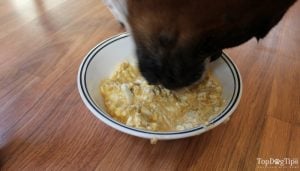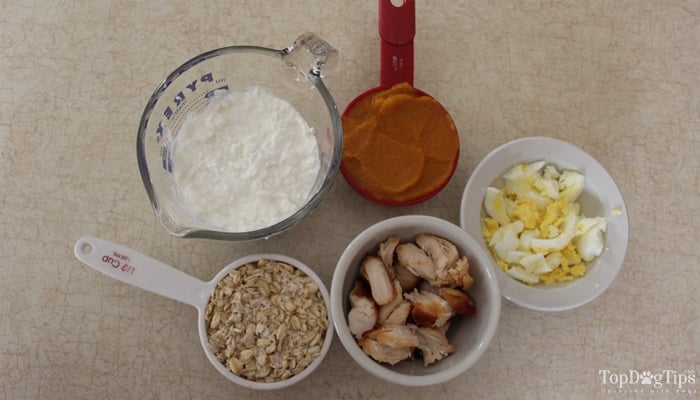Table of Contents
Unfortunately, for dogs diagnosed with liver disease, there are no specific treatments available.
The only way to treat liver disease in dogs is to adjust their diet and ensure they're always well-hydrated.
This homemade dog food for liver disease recipe I show you in the video above and discuss later in this article is specifically designed to help with the condition.
Like in humans, the canine liver is a vital organ involved with almost every process and is directly responsible for many functions in the body.

It also plays a significant role in a dog's immune system and ability to fight off diseases. Dogs with liver disease are at more risk of contracting many other illnesses, which is why it's essential to treat them immediately.
Having your dog diagnosed with the liver disease means that you will need to change this diet.
Even though some commercial dog food brands for liver disease, many vets recommend making your homemade dog food for liver disease.
Ultimately, the severity of your dog's condition will dictate the specific nutritional requirements.
Before you try this homemade dog food recipe for liver disease, you must speak with your veterinarian.
Do not switch your dog to a homemade diet until then. When it comes to canine liver disease, any changes to what your dog eats should be made with extra care and caution.
The reason being is because this condition is susceptible. If your dog receives too much or too few specific nutrients, that could accelerate the progression of his liver disease condition.
Your veterinarian may even refer you to a canine nutritionist for testing and a more detailed nutritional plan, so make sure you check with them beforehand.
If your dog has a sensitive stomach, this condition especially needs careful monitoring.
Now, if you've already spoken with your vet about your dog's condition and you're looking for homemade dog food for liver disease recipe, this one may be right for your Fido.
Note: We created this homemade dog food recipe for a dog weighing about 50 pounds.
MORE RECIPES HERE: Homemade Dog Food & Treats Recipes
Homemade Dog Food for Liver Disease Recipe
Ingredients
- 3/4 cup low-fat cottage cheese
- 1/2 cup cooked, diced chicken
- 1/2 cup cooked oatmeal
- One boiled egg
- 1/2 cup canned pumpkin
Directions
The best thing about this homemade dog food for liver disease recipe is straightforward to make. As you see in the video, with about 15-20 minutes of prep work, you'll have a meal ready to serve to your Fido.
The more often you do this, the quicker the process becomes.
You'll have to get used to repetition since there aren't that many dog food choices for dogs with liver disease, so their diet will be pretty mundane for a while.
Start by cooking the chicken any way that you prefer. You can boil it, bake it or cook it in a frying pan on your stovetop – it doesn't matter, as long as it is thoroughly cooked. You'll also need to boil the egg in advance and cook the oatmeal.
Once those three ingredients have been cooked, all you need to do is mix it all. You'll want to chop the egg and cube the chicken.
Then you can combine all five ingredients in a large mixing bowl.
RECOMMENDED: Holistic Dog Health 101 – Ultimate Science-Based Guide
As you can see, this homemade dog food for liver disease recipe doesn't look very appetizing to us.
But trust me when I tell you that your dog will completely disagree. The aroma of the chicken, egg, and cottage cheese will drive him wild! See my boxer, Chloe, devouring her meal below.
Creating a Diet for a Puppy
When you're trying to create a diet for a puppy with liver disease, there are a few things you want to focus on, including:
- high quality, easily digestible protein sources
- low in copper and sodium (stay away from organ meat, especially liver)
- high in antioxidants
- high in fat (your vet may recommend 20-50% fat in your dog's diet)
 Carbohydrates are another nutrient that will need to be provided in your dog's diet. They aid in digestion and add fiber to his diet.
Carbohydrates are another nutrient that will need to be provided in your dog's diet. They aid in digestion and add fiber to his diet.
Carbohydrates also help to remove ammonia from the system, which the liver may not be able to do on its own anymore.
Your veterinarian may also recommend certain supplements to add to your homemade dog food. Popular accessories for pets with a failing liver include Vitamin E, Vitamin B complex, Vitamin C, Vitamin K, and Zinc.
The necessity of these supplements will depend on your dog's unique condition, so don't add them unless directed to by your veterinarian or a canine nutritionist.
This recipe will make about 3 cups of dog food. You can serve it to your pet as soon as it is thoroughly mixed.
Store any leftovers in an airtight container in the refrigerator for up to 5 days. You can also make a larger batch and store it in an airtight container in the freezer for up to 2 months.
More Information on Dog Liver Disease
Knowing good dog food recipes for liver failure or disease is just one part of taking care of your pup with liver issues.
You should also make sure to have a semi-thorough understanding of the disease itself. While your vet can answer your questions, it is helpful to know what to expect with dogs with liver disease.
A Quick Overview of Canine Liver Disease
Canine liver disease (CLD) negatively affects the way that your dog's liver functions. In mild cases, the liver only slows down.
In severe cases, your dog may experience liver failure. The disease typically worsens over time, but catching it early and adjusting your dog's diet can help fight it.
To understand CLD, remember that the liver removes toxins and external waste from the body. If your dog has CLD, the liver can't effectively expel these toxins and waste. This lets those harmful substances build up.
Another function of the liver is producing bile. Bile helps with digestion, which is why liver issues can negatively affect the digestive system.
The good news is that the liver can regenerate with proper care.
Warning Signs of Liver Disease in Dogs
One of the first steps to creating a dog liver disease diet is recognizing that your dog has issues with his liver.
Your vet can diagnose liver damage, but you need to know to take your pup to the vet in the first place.
If you notice any of the following signs, your dog's health, precisely that of his liver, maybe at risk.
Jaundice
Jaundice is when the skin has a yellowish tinge. Because of their fur, jaundice on canines is most noticeable by their ears, gums, and eyes.
Gastrointestinal Problems
Issues with your dog's liver function can lead to a range of GI issues. These may include excessive urination, weight loss, vomiting, decreased appetite, diarrhea, visibly increased thirst, or changes to his stool color.
Hepatic Encephalopathy
Hepatic encephalopathy refers to a variety of neurological symptoms that are a result of liver issues.
Dogs with these symptoms may experience personality changes, anxiety, blindness, disorientation, seizures, or confusion. The combination of symptoms is a severe brain condition.
Other Potential Symptoms
In addition to the symptoms already mentioned, the following are other potential signs that your dog's liver health needs attention:
- Lethargy
- Blood in feces or urine
- Play bowing
- Instability while walking
- Abdominal swelling
- Licking lips
- Itching
- Muscle wastage (but in advanced cases)
The exact symptoms will depend on the type of liver disease that your dog has. Hepatic encephalopathy is one type. Others include:
- Acute liver failure: This is when the liver suddenly loses function. It is commonly linked to blood clotting problems and neurological issues.
- Chronic hepatitis: This is the most common liver disease affecting dogs. Numerous potential risk factors include genetics, infectious agents, copper, severe trauma, and infections.
- Portosystemic shunts: Most dogs are born with this issue but can also develop the following illness. This condition, PSS, is when an abnormal vein connects the blood supply from the intestines with the vein that brings blood to the heart. The abnormal vein bypasses the liver or “shunts” the blood flow past the liver.
Potential Causes of Liver Disease in Dogs
You can control some of the potential causes of liver problems in your canine but not all. Some possible reasons include:
- Poor diet
- Stress
- Endocrine disease
- Copper toxicity
- Infectious agents, including viral ones or leptospirosis
- Certain pharmaceuticals
- Severe trauma
Common Questions about Feeding Dogs with Liver Problems
Have lingering questions about caring for dogs with liver problems, specifically what to feed your pup? The following should answer them for you.
What Is the Goal of the Proper Diet for Poor Liver Function?
There are a few primary goals when developing a diet for dogs with liver disease.
You want to give your pup enough nutrition so he can maintain his overall health and energy.
Also, you want to encourage liver regeneration while reducing stress on the liver.
You also want to prevent complications.
Finally, you want to prevent copper and other substances from accumulating in the liver and further damaging it.
What Foods Are Good for Dogs with Liver Disease?
Dogs with liver disease should eat some dairy products, with ricotta cheese, cottage cheese, goat cheese, and yogurt is good options.
You should give your pup high-quality protein sources, such as fish, eggs, boneless chicken, and boneless turkey.
Importantly, you want to choose protein sources that are low in copper. Limit pork, salmon, lamb, and duck, all of which are high in copper.
Fish oil is also a good addition, thanks to its omega-3 fatty acids. Ensure your dog gets soluble fiber with plain canned pumpkin, barley, white rice, or oatmeal.
Your dog can also enjoy coconut oil, seedless watermelons, papayas, figs, blueberries, and other fruits.
What Should Dogs with Liver Problems Not Eat?
If your dog has liver issues, avoid giving him fish or organ meats that are high in purines. It would help if you also avoided meats with high copper content.
How Do You Treat a Dog with Liver Disease Naturally?
Diet changes are an essential part of treating your dog's liver problems. Your vet may also suggest supplements like milk thistle or SAM-E. In the case of infections, your vet may suggest antibiotics as well.
How Can I Improve My Dog's Liver Function?
The most crucial step is to consult your dog's vet. They will recommend any dietary or lifestyle changes as well as medications.
For example, they are likely to suggest a diet high in fat and low in protein.
Can a Dog's Liver Repair Itself?
The term liver regeneration can be somewhat confusing. That is because the liver can heal itself, but only up to a certain point.
Once the liver disease becomes terminal, it is too late to reverse the damage. Before this, however, you may be able to restore your dog's normal liver function.
Whether your dog's liver can repair itself depends on the severity of the disease, how early you catch it, and the cause of the disease.
WATCH NEXT: How To Make Homemade Dog Food – Instructional Video














